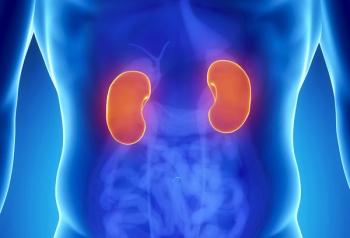Articles by Audrey Sternberg

Based on data from the phase 3 VISION trial, 177Lu-PSMA-617 may now be used to treat patients who were previously treated with androgen receptor pathway inhibitors plus taxane-based chemotherapy for metastatic prostate specific membrane antigen–positive castration-resistant prostate cancer.


For Kidney Cancer Awareness Month, CancerNetwork® spoke with Daniel M. Geynisman, MD, about how emerging data in the treatment of renal cell carcinoma stand to further impact the standard of care.

An overview of the phase 3 ARTISTRY-7 trial involving combination therapy with nemvaleukin alfa and pembrolizumab was presented at 2022 SGO.

Recently presented data from the KEYNOTE-091 trial show a trend toward survival benefit with adjuvant pembrolizumab in patients with resected non–small cell lung cancer, especially in patients with PD-L1–positive disease.

Statistically significant progression-free survival benefit of toripalimab plus chemotherapy vs matched placebo was reported in patients with untreated metastatic non–small cell lung cancer, according to data from the CHOICE-1 trial.

Primo Nery Lara, Jr., MD, talks treatment of metastatic renal cell carcinoma in the first-line setting at the 15th Annual Interdisciplinary Prostate Cancer Congress® and Other Genitourinary Malignancies, hosted by Physicians’ Education Resource®, LLC.

An analysis presented at 2022 IGCC showed that the level of CD8 + cells in the outer margin of gastric cancer tumors was significantly associated with survival outcomes and could inform prognosis.

In a presentation at 2022 IGCC, Ju-Seog Lee, PhD, discussed an analysis that combined tumor classification models to derive new prognostic subgroups in gastric cancer.

Based on results of the phase 3 CheckMate-816 trial, the FDA granted approval to the combination of nivolumab plus platinum-doublet chemotherapy for the treatment of non–small cell lung cancer prior to surgery.

In a pre-planned pooled analysis of data from the MC1273 and MC1675 trials presented at the 2022 ASTRO Multidisciplinary Head and Neck Cancers Symposium, de-escalated adjuvant radiation therapy met criteria for efficacy in human papillomavirus–related oropharyngeal squamous cell carcinoma.

The FDA designated the FoundationOne CDx assay as a companion diagnostic for identifying tumors that are microsatellite instability–high and may benefit from pembrolizumab.

Data from the ARASENS trials that were presented at 2022 ASCO GU show superior survival outcomes with darolutamide vs placebo plus ADT and docetaxel.

The CD19-directed CAR T-cell therapy lisocabtagene maraleucel was granted priority review by the FDA following an application for its use in patients with relapsed or refractory large B-cell lymphoma receiving therapy in the second-line setting.

Updated results from a cohort of the KRYSTAL-1 trial spotlight the potential of adagrasib for patients with previously treated KRAS G12C¬–mutant gastrointestinal tumors.

The Japan Ministry of Health, Labour and Welfare granted approval to the KRAS inhibitor sotorasib for the treatment of adults with KRAS G12C–mutated non–small cell lung cancer.

Data for ciltacabtagene autoleucel from CARTITUDE-1 show that use in the setting of heavily pretreated multiple myeloma bests standard-of-care treatments.

A phase 2 trial shows promise of the daratumumab/ixazomib combination in frail and elderly patients with multiple myeloma who are treated in the relapsed setting when given without dexamethasone.

Pooled efficacy and safety data confirm that patients who self-identify as Black or Hispanic can be safely treated with palbociclib plus endocrine therapy for hormone receptor–positive, HER2-negative advanced breast cancer.

Imaging mass cytometry at the single-cell level showed potential as an immunotherapy response prediction tool in early triple-negative breast cancer.

CancerNetwork® spoke with Allyson J. Ocean, MD, Diane M. Simeone, MD, Manuel Hidalgo Medina, MD, PhD, and Andrew E. Hendifar, MD, about their recent research into the treatment of pancreatic cancer.

Adult patients with polycythemia vera may now be treated with ropeginterferon alpha-2b, the only interferon available for this population.


Although there was no resulting benefit to overall survival with the addition of short-term androgen deprivation to dose-escalated radiotherapy, patients with intermediate-risk prostate cancer experienced other disease benefits with this treatment approach.

Patients who were treated with extreme hypofractionation after breast conserving surgery saw no increase in ill-treatment effects compared with those receiving moderate hypofractionation.

Based on a subgroup analysis from the monarchE trial, the FDA approved abemaciclib as adjuvant therapy in women with high-risk early breast cancer

After chromosomal abnormality was detected in a single patient treated on the ALPHA 2 trial, the FDA placed a clinical hold on the study pending further information.

The Alpha DaRT system was granted breakthrough device designation by the FDA for the treatment of glioblastoma.

Tisotumab vedotin may now be used to treat patients with recurrent or metastatic cervical cancer after the FDA's decision to grant the agent an accelerated approval.

Results from the phase 2 ODEZA trial comparing patient preference of antiandrogen agents indicates benefits of darolutamide over enzalutamide in terms of certain cognitive functions in men with metastatic castration-resistant prostate cancer.



























